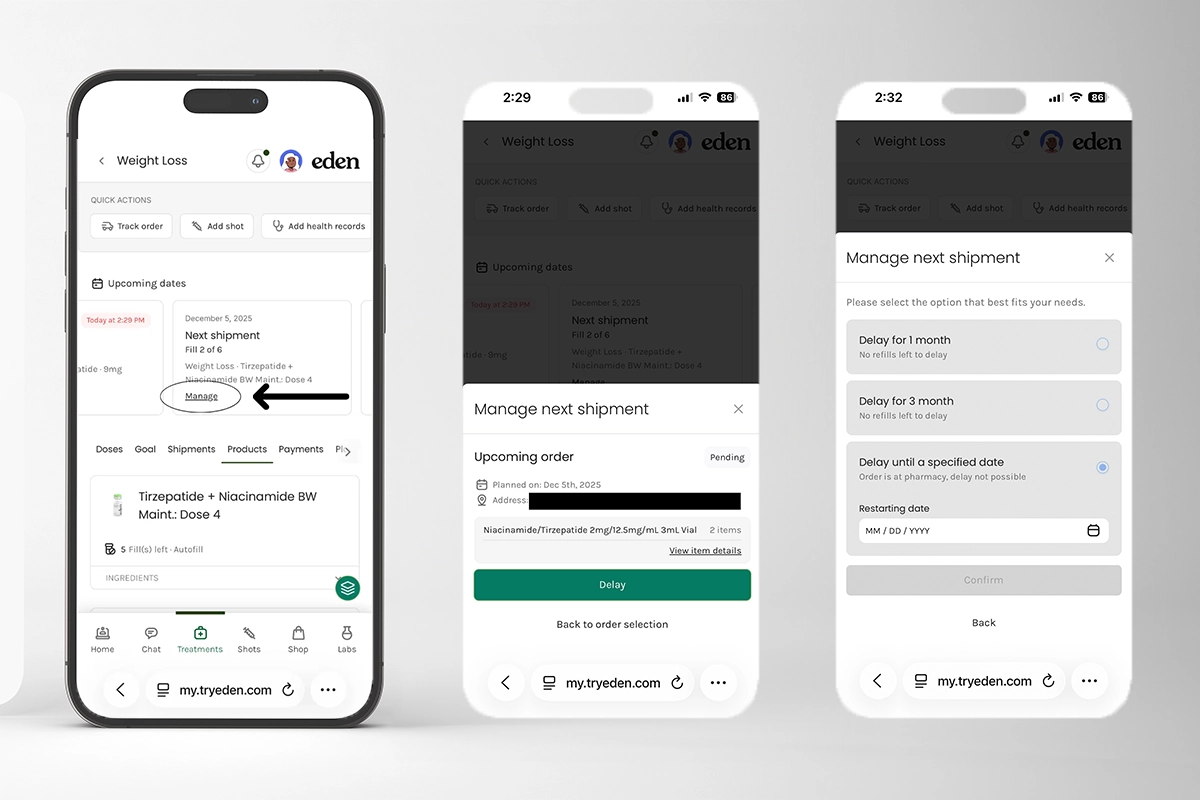Semaglutide and Headache: What You Should Know
Headaches from semaglutide therapy? Learn common causes, prevention tips, and when to speak with your provider.
- Headaches have been reported in clinical trials involving semaglutide and similar GLP-1 medications.
- They may be related to hydration, changes in blood sugar, or neurological mechanisms.
- Most headaches occur early during treatment and may be temporary.
- Maintaining hydration, monitoring glucose levels, and eating regularly may help prevent symptoms.
GLP-1 receptor agonists like semaglutide (found in FDA approved medications such as Ozempic® and Wegovy®) are widely prescribed to support weight management and type-2 diabetes care. While these medications are effective, they may cause side-effects. Headaches are one such effect reported by some users, especially during the early stages of treatment.
This guide explains the possible causes of GLP-1 associated headaches, how common they are, and strategies to help reduce discomfort with the support of your healthcare provider.
Disclaimer: This article is for educational purposes only and does not constitute medical advice. Always consult a licensed healthcare provider before starting or modifying treatment. Eden offers only FDA approved GLP-1 medications, prescribed and monitored by licensed professionals.
Are Headaches a Known Side Effect?
Yes. Clinical studies have documented headaches among patients taking GLP-1 receptor agonists such as semaglutide. In a major clinical trial assessing semaglutide for weight management, 15.2 percent of participants reported headaches compared to 12.2 percent in the placebo group1.
While headaches are not the most common side effect, they are recognized and may appear during the early adjustment period of treatment, particularly as the body responds to changing blood sugar and hydration status.
What May Be Causing the Headache?
Dehydration
GLP-1 medications may reduce appetite or cause nausea and vomiting. This may lead to lower fluid intake and potential dehydration, which is a known cause of headaches2.
Blood Sugar Fluctuations
GLP-1 therapies are designed to support improved glycemic control. However, when combined with other glucose lowering agents or if meals are missed, they may contribute to low blood sugar. Hypoglycemia is a common cause of headaches3.
Central Nervous System Activity
GLP-1 receptors are found in the brain. Their activation may affect neurological pathways. Although the exact mechanism is still being researched, these brain interactions may contribute to the onset of headaches in some individuals4.
Individual Sensitivity
People with a history of migraines, sleep disturbances, or high stress levels may be more likely to experience headaches during medication adjustments.
{{primary-cta}}
How to Help Prevent or Reduce Headaches
The following strategies may support your comfort and may reduce the chance of headaches during semaglutide treatment:
- Hydration: Drink 8 to 10 cups of water daily, especially during the first few weeks of therapy.
- Consistent Nutrition: Do not skip meals. Balanced, frequent meals may help stabilize blood sugar levels.
- Glucose Monitoring: If you are also using insulin or other medications, track your blood glucose to avoid sudden changes.
- Sleep Quality: Aim for 7 to 9 hours of sleep each night.
- Stress Management: Try deep breathing exercises, light physical activity, or mindfulness to manage stress.
- Pain Relief: Use over the counter pain relievers only after speaking with your healthcare provider to ensure they are appropriate for your treatment plan.
When to Contact Your Provider
Headaches related to semaglutide medications are usually mild, but you should consult your provider if you experience:
- Headaches that persist or worsen over time
- Headaches accompanied by vision changes, nausea, or confusion
- Pain that interferes with daily tasks or quality of life
- Any new symptoms that may relate to your current medication regimen
Your provider may assess your hydration status, evaluate potential interactions, or adjust your dose or schedule to improve your experience.
Final Thoughts
Headaches may occur during semaglutide treatment, but in most cases, they are manageable and temporary. Taking steps to stay hydrated, eat balanced meals, and manage stress may reduce symptoms. Open communication with your provider is key to creating a treatment plan that supports your goals and ensures your comfort.
Eden connects patients with licensed providers who prescribe personalized GLP-1 medications. Your provider will guide your treatment, monitor for side effects, and adjust your care plan as needed.
Disclaimer: The FDA does not approve compounded medications for safety, quality, or manufacturing. Prescriptions and a medical evaluation are required for certain products. The information provided on this blog is for general informational purposes only. It is not intended as a substitute for professional advice from a qualified healthcare professional and should not be relied upon as personal health advice. The information contained in this blog is not meant to diagnose, treat, cure, or prevent any disease. Readers are advised to consult with a qualified healthcare professional for any medical concerns, including side effects. Use of this blog's information is at your own risk. The blog owner is not responsible for any adverse effects or consequences resulting from the use of any suggestions or information provided in this blog.
Eden is not a medical provider. Eden connects individuals with independent licensed healthcare providers who independently evaluate each patient to determine whether a prescription treatment program is appropriate. All prescriptions are written at the sole discretion of the licensed provider. Medications are filled by state-licensed pharmacies. Please consult a licensed healthcare provider before making any medical decisions.
Frequently asked questions
Blog Components



References
- Once Weekly Semaglutide in Adults with Overweight or Obesity. Link
- Incretin Hormones: Their Role in Health and Disease. Diabetes, Obesity and Metabolism. Link
- Comparative efficacy and safety of GLP-1 receptor agonists for weight reduction: A model-based meta-analysis of placebo-controlled trials. Link
- Central effects of GLP-1: new opportunities for treatments of neurodegenerative diseases. Link
The wellness insight you need, without the noise.




















